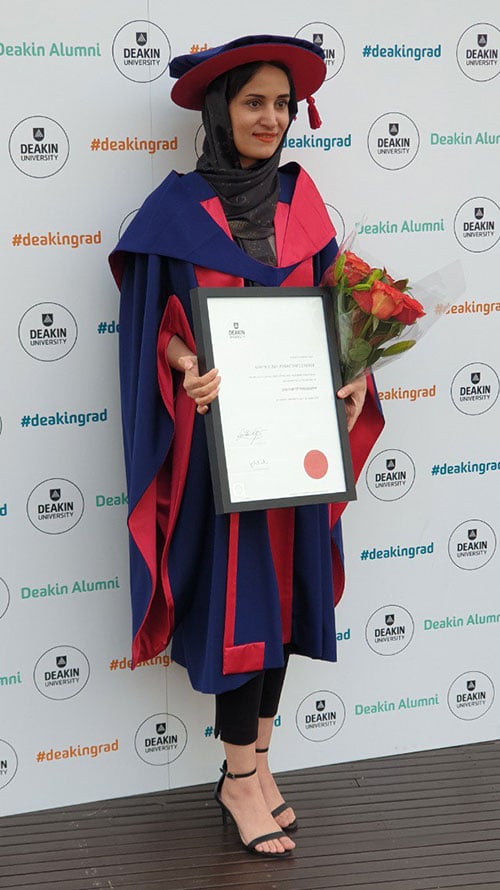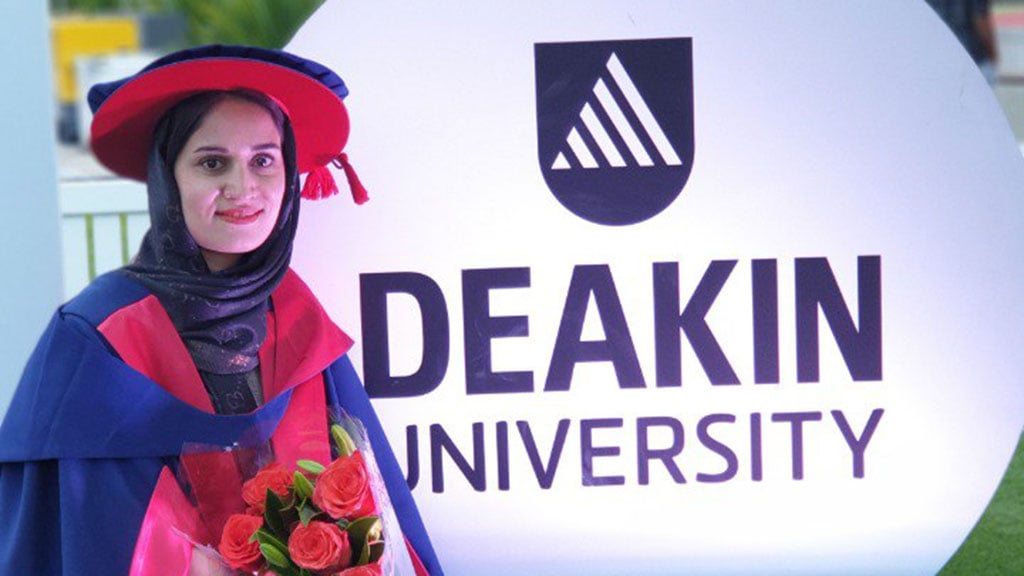How Maha pushed through the STEM ‘glass ceiling’ – and her advice to female students
With more and more women choosing careers in one of the STEM (science, technology, engineering and mathematics) fields, these traditionally male-dominated industries are starting to become more diverse. But there’s still some way to go to achieve true gender balance and equality, and it hasn’t always been easy for those women who’ve led the way.
To find out what it’s really like for a female student to learn and work in areas still dominated by male teachers, students and colleagues, we chatted to an inspiring Deakin graduate who’s helping to change the face of engineering.
Dr Mahboubeh Parastarfeizabadi (‘Maha’) achieved her PhD in Engineering at the Waurn Ponds Campus in October 2019. Her thesis focused on ‘designing and developing a multi-biomarker closed-loop deep brain stimulation device to alleviate neurological disorders’ (wow!). She’s now working as a technical service engineer in a medical device company on endoscopy and colonoscopy medical devices.
Once you’ve digested these incredibly impressive achievements, read on to hear about how Maha persisted with her STEM dreams, even in the face of some barriers and discrimination.
 Two of my favourite school subjects were mathematics and art. I was very good at both, and it was challenging for me to decide to become an engineer or an artist. After battling with myself and thinking about what I truly wanted in my future life, I chose to pursue the engineering career path in high school and then at university – so far with no regrets!
Two of my favourite school subjects were mathematics and art. I was very good at both, and it was challenging for me to decide to become an engineer or an artist. After battling with myself and thinking about what I truly wanted in my future life, I chose to pursue the engineering career path in high school and then at university – so far with no regrets!
We had some teachers and counsellors at school who encouraged girls to take a different study pathway than boys. They believed that STEM subjects were more suited to boys than girls. But I wanted to continue to pursue my chosen career, no matter what other people might think or say.
There were no barriers from my family for me to choose an engineering degree. However, I was the only one among my best friends who wanted to become an engineer. They wanted me to stay with them in high school and university classes. It was hard to go a different way, but I decided to follow my interests and goals.
Being one of only a few girls in engineering classes is nothing out of the ordinary. In my undergraduate biomedical engineering class, there were about 20 female students and about 60 males. This wasn’t too bad compared to civil and mechanical engineering, which only had about three females. All our lecturers and supervisors were male, except for a few rare classes in which we had female lecturers. There now seems to be slightly more female lecturers and supervisors, which is great.
There have been more than a few times when I’ve felt under extra pressure because of my gender, especially during my bachelor degree. I was afraid of making mistakes because I was concerned my male classmates or teachers could use that to prove that women aren’t capable and shouldn’t do engineering degrees. Sometimes in our group projects, my male classmates ignored and disregarded my input. However, during my masters degree and PhD, I never felt under extra pressure because of my gender. It might be because I was on my own doing my research thesis and was dealing less with male peers.
After I finished my PhD, I applied for hundreds of jobs and only had about seven interviews over almost two years. I am not sure if it was because of my gender, or perhaps coming from a different culture, or even because of COVID-19 that it took me a long time to find a full-time job. Despite all the efforts, I am glad that I am employed in a positive environment with great people who are support gender equality. Here, and in past work experience as a casual research fellow at Deakin, I never felt gender discrimination from my male peers and managers.
If you’re a female student interested in STEM, I can only say: go for it! Don’t put any restrictions on yourself because of your gender or what anyone else thinks or says. Just follow your passions, take the adventurous path, upskill yourself and go for the limitless opportunities available in any of the STEM industries.
Interested in a STEM career? Find out more about what’s on offer at Deakin.
At Deakin, we challenge views that condone violence, disrespect, power imbalances and inequity. Any form of sexual harm, violence or harassment is a breach of mandatory standards of behaviour that all students and staff must meet. We offer a range of support services, resources and referral pathways to assist any student or staff member who is directly or indirectly impacted.
Read more about our Sexual Harm Prevention Policy and find out more about Deakin’s commitment to respect, diversity and inclusion.
